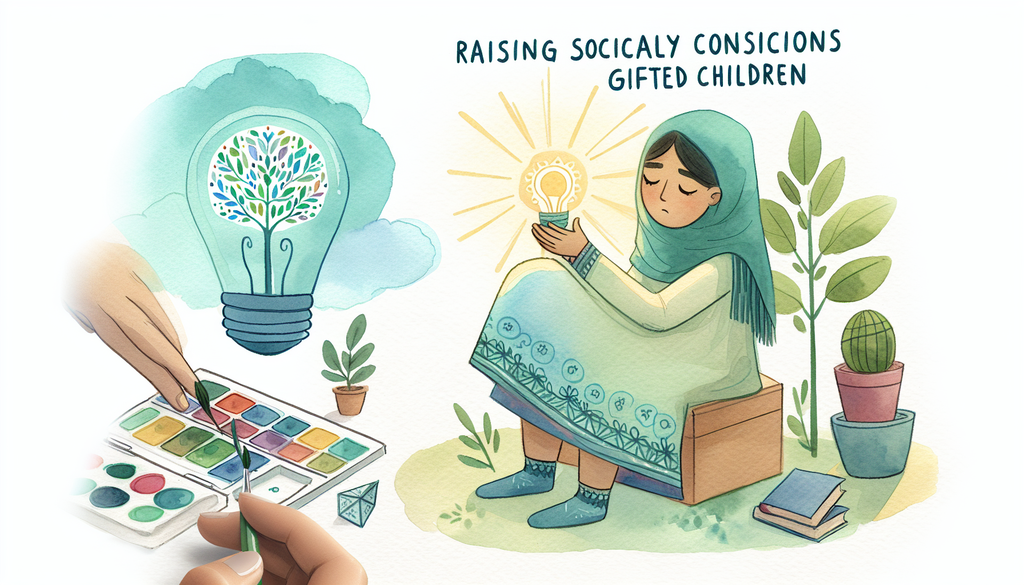Raising Socially Conscious Gifted Children

Raising children with a keen sense of social awareness and a desire to contribute to the larger community and global issues can be tremendously fulfilling. This becomes even more significant when dealing with gifted children who often possess an innate sensitivity to the world around them, coupled with extraordinary intellectual capacities. This post aims to guide parents through the process of nurturing social consciousness in gifted children.
Understanding Social Consciousness in the Gifted Child
Gifted children typically demonstrate an acute awareness of what’s happening around them. They may be particularly responsive to social, environmental, or moral issues. These children don’t just perceive the world around them; they question it, dissect it and often feel motivated to contribute positively to it. Giftedness Unwrapped: Identifying Your Child’s Strengths throws more light on the unique characteristics of gifted children.
Cultivating Social Responsibility
To cultivate social responsibility in gifted children, parents and caregivers must validate their concerns about societal, environmental, or justice issues. Encourage open discussions and involve them in activities aimed at helping their communities or supporting causes they care about. Guiding gifted children to become active members of their community helps them feel empowered and purposeful. Empowerment Through Knowledge: Educating Yourself as a Parent offers more insights on empowering gifted children.
Here are some actionable steps to cultivating social responsibility:
-
Discuss Current Events: Engage your gifted child in discussions about current events matching their interest and complexity level. Make sure to address their questions and concerns, and brainstorm possible solutions or ways to contribute.
-
Encourage Volunteerism: Encourage your child to participate in volunteer activities or community service. This can range from involvement in local community events to international programs. You can find suggestions in our previous post Power in Numbers: Starting a Support Group for Parents.
-
Promote Environmental Consciousness: If your child shows an interest in environmental issues, seek ways to engage them actively. This could mean starting a recycling program at home, participating in community cleanups, or even starting a school environmental club.
-
Teach Empathy: Teaching empathy is a crucial aspect of instilling social consciousness. Regularly discuss emotions, thoughts, and perspectives other than their own.
-
Engage in Socially Conscious Learning: Incorporate socially conscious topics into their learning. Teach them about diverse cultures, social issues, and global challenges.
The Benefits of Social Consciousness
Children who are socially aware often become adults who strive to make a positive difference in the world. They tend to be thoughtful, compassionate, and proactive problem-solvers. Such qualities not only enrich their personal lives but also make them valuable members of society. A blog post on our site titled Unleashing Potential: Enabling Autonomy in Gifted Children speaks more on the benefits of nurturing these qualities.
Overcoming Potential Challenges
While raising socially conscious gifted children is rewarding, it can also pose unique challenges. These children can often feel overwhelmed by the injustices and challenges they perceive around them, leading to stress or anxiety. Be ready to provide the emotional support they might need. Our article Giftedness and Emotional Sensitivity: Nurtifying Emotional Intelligence provides more guidance on this topic.
Likewise, their intense focus on certain issues may sometimes lead to conflicts with peers who may not share the same perspectives or intensity. Teaching your child tact, respect for others’ opinions, and productive dialogue skills will be invaluable. We have some tips in our post on Navigating Friendships: Social Skills for Gifted and Special Needs Kids.
In conclusion, fostering social consciousness in gifted children is a journey filled with teachable moments. It’s about promoting awareness, cultivating empathy, and empowering these capable young minds to contribute positively to their communities and the larger world. It’s a journey certainly worth taking and one that we believe ultimately shapes responsible, compassionate, and proactive members of society.